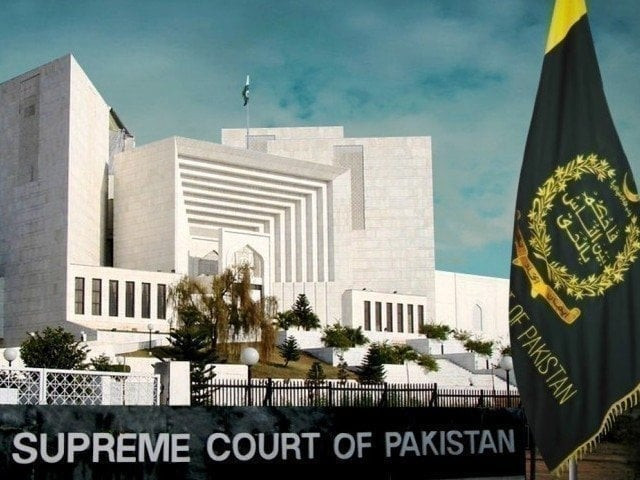Islamabad:
After the submission of petitions on various questions of five judges of the High Court of Islamabad (CIH), the ball is now before the court of the Supreme Court, because it will decide their grievances linked to judicial independence as well as to the trichotomy of powers.
This is not the first time that the judges of the IHC have approached the Supreme Court. In March of last year, they wrote a letter to the Supreme Judicial Council (SJC) requesting advice on the interference of executive agencies in judicial functions.
It should be noted that judge Muhammad Arbab Tahir was also part of the group of judges at the time. However, he is no longer with them, which can have implications for their case.
The former judge of the High Court of Lahore, Shahid Jamil Khan, expressed deep pain about development, affirming that it was the worst era of the judicial history of Pakistan. The Judges of the IHC, constitutionally required to provide justice, themselves seek justice through a constitutional petition.
“Although unusual to deposit a petition in person, I approve of it as necessary to shake up the conscience of the judges who are in the same building of the Supreme Court, where the assaulted judges went in an ordinary way to ask justice. I felt personally dismayed to see the corpus absent from the judiciary, said the former LHC judge.
Renowned lawyer Saiful Malok said he had read the constitutional petitions deposited by the IHC judges. He noted that the main allegations of the petition – are close to the interference of the leaders in the functioning of the high court, the judges having forced not to decide the cases in accordance with the Constitution and the Law, and the violations of the judicial oath – were unprecedented.
He said these allegations were not only against the executive but also against the outgoing chief judge and the Supreme Court of Pakistan himself.
“It seems that this is a case of first impression, never carried by the judges of a federal constitutional court in any country around the world. A historic burden has been imposed on the Supreme Court: either to stay with constitutional guarantees and protect the fundamental rights of the judges of a constitutional judge, or to declare that their position is not better than the judges of the petitioners.
“If they are unable to maintain the Constitution, they should say it openly, so that the inhabitants of Pakistan clearly know that the judicial body of the State is fraud and that the judges of the highest court are only concerned with a monthly salary of RS3 million more the advantages of more than 5 million rupees, and that no one should seek them for justice,” declared Malook.
Lawyer Chaudhry Faisal Hussain said that as a lawyer, it was a very depressing and sad day.
“It is indeed painful and stressful to see my own institution collapse in such a way that the judges themselves are at the Supreme Court to ask for justice. This is not a specific question of the person; it is the institution of the judiciary who is attacked,” he added.
He also declared that the order retaining the judge Tariq Mehmood Jahangiri was illegal and unconstitutional, because under the Constitution, only the Supreme Judicial Council (SJC) has the power to take complaints against the judges of the Superior Court.
When six IHC judges wrote to the SJC earlier, they were summoned by the former chief judge of Pakistan Qazi Faez Isa at the CJP house. The reports suggest that judge Isa was visibly upset by their letter.
However, he was forced to convene a complete justice meeting to discuss it. The next day, the former CJP, accompanied by judge Syed Mansoor Ali Shah, met Prime Minister Shehbaz Sharif and suggested the constitution of a commission of inquiry to investigate allegations.
When former CJP Tassaduq Hussain Jillani challenged the commission of inquiry, the CJP Isa had no choice but to initiate the SUO Motu procedure on the letter of the judges of the IHC.
During the hearing, various high lessons also admitted that the agency’s interference in legal functions was a “secret of the polichinelle”. The case remains pending.
Meanwhile, the government has succeeded in adopting the 26th constitutional amendment. The aim of this amendment, according to criticism, was to guarantee executive domination over the judiciary. Since its time, the government has largely managed to tighten its control.
When five judges challenged the transfer of three judges to the IHC, the Supreme Court approved the executive plan. Now, once again, the judges of the IHC have approached the Supreme Court.
The main lawyers believe that the executive wants the SJC to be activated against Judge Jahangiri.
The role of six SC judges will be crucial in terms of IHC judges. Likewise, the role of three SJC members – CJP Yahya Afridi, judge Syed Mansoor Ali Shah and Judge Munib Akhtar – will also be decisive. Similarly, a committee of three members including Judge Aminuddin Khan, judge Jamal Khan Mandokhail and judge Muhammad Ali Mazhar will decide to fix their petitions.
There is a perception that neither the five judges of the IHC nor the chief judge of the CIH, Sardar Muhammad Sarfraz Dogar, are in the good books of a certain section of the judiciary which currently holds the SC.
The detailed judgment of the IHC judges transfer case will be important. Even minority opinion can support the position of the five judges of the CIH.




